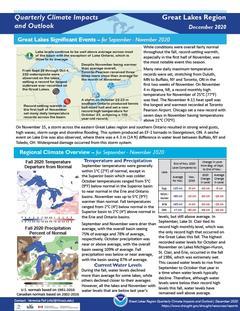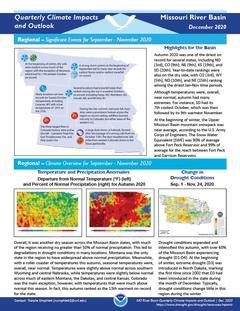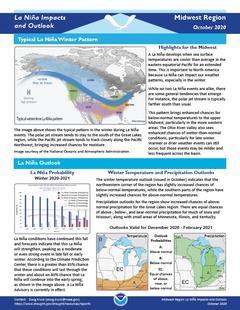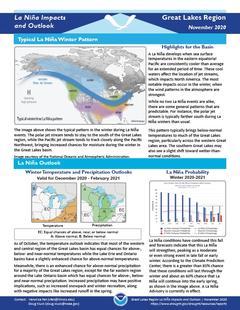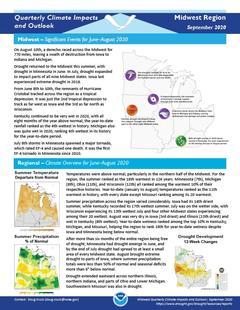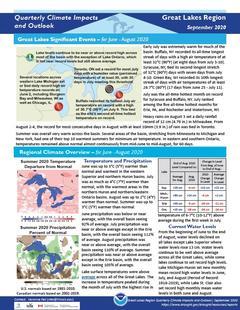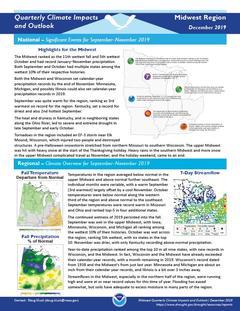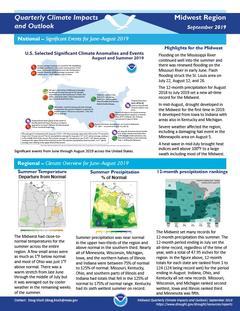Quarterly Climate Impacts and Outlook for the Great Lakes Region for September – November 2020. Dated December 2020.
While conditions were overall fairly normal throughout the fall, record-setting warmth, especially in the first half of November, was the most notable event this season. Fall precipitation was below or near average, with the basin seeing 87% of average.
Quarterly Climate Impacts and Outlook for the Missouri River Basin September – November 2020. Dated December 2020.
Autumn 2020 was one of the driest on record for several states, including North Dakota (3rd), Colorado (9th), Nebraska (9th), Kansas (19th), and South Dakota (20th). Although temperatures were, overall, near normal, autumn had many extremes.
Provides information on the typical La Niña winter pattern; the La Niña outlook; potential impacts; and comparisons of conditions during previous La Niña years.
NOAA’s Regional Climate Services Program created these outlooks to inform the public about climate impacts within their respective regions. Each regional report contains easy-to-understand language, and anyone can access them through the Drought Portal.
Provides information on the typical La Niña winter pattern; the La Niña outlook; potential winter and spring impacts; and comparisons of conditions during previous La Niña years.
NOAA’s Regional Climate Services Program created these Outlooks to inform the public about climate impacts within their respective regions. Each regional report contains easy-to-understand language, and anyone can access them through the Drought Portal.
uarterly Climate Impacts and Outlook for the Midwest Region for June – August 2020. Dated September 2020.
Temperatures were above normal, particularly in the northern half of the Midwest. For the region, the summer ranked as the 18th warmest in 126 years. Summer precipitation across the region varied considerably. Iowa had its 14th driest summer, while Kentucky recorded its 17th wettest summer.
Quarterly Climate Impacts and Outlook for the Great Lakes Region for June – August 2020. Dated September 2020.
Summer was overall very warm across the basin. Several areas of the basin, stretching from Minnesota to Michigan and New York, had one of their top 10 warmest summers for minimum air temperature. In eastern and southern Ontario, temperatures remained above normal almost continuously from mid-June to mid-August. Summer precipitation was near or above average except in the Erie basin, with the overall basin seeing 105% of average.
Quarterly Climate Impacts and Outlook for the Great Lakes Region for December 2019 – February 2020. Dated March 2020.
Most of the Great Lakes states had one of their top 10 warmest winters on record. Winter was drier with the basin seeing 84% of average. There was below average ice cover due to warm air temperatures and lack of consecutive days below freezing.
Quarterly Climate Impacts and Outlook for the Midwest Region for September – November 2019. Dated December 2019.
Temperatures in the region averaged below normal in the upper Midwest and above normal further southeast. The continued wetness of 2019 persisted into the fall. Year-to-date precipitation ranked among the top 10 in all nine states, with new records in Wisconsin, and the Midwest.
Quarterly Climate Impacts and Outlook for the Great Lakes Region for September – November 2019. Dated December 2019.
Autumn temperatures ranged from 2°C (4°F) below normal to 2°C (4°F) above normal. Autumn precipitation ranged from 88% to 125% of average, with the overall basin seeing 115% of average.
Quarterly Climate Impacts and Outlook for the Midwest Region for June – August 2019. Dated September 2019.
The Midwest had close-to-normal temperatures for the summer across the entire region. Summer precipitation was near normal in the upper two-thirds of the region and above normal in the southern third.


